- Home
- Brian Keene
Entombed Page 5
Entombed Read online
Page 5
“That’s very kind of you.” I said it loud enough so that he could hear me through the door, hoping to distract him and keep him talking long enough for me to escape. Chuck was right about one thing. I was outnumbered and overwhelmed. I didn’t know how many people he had out there with him, but even if it was just three of them, I’d have a problem defending myself in this small space, with only a fire extinguisher and my fists to use as weapons. Hunger had physically weakened all of us, but three against one was bad odds no matter how strong a person was.
“We’re coming in now,” Chuck said. “My advice to you is to not fight it. You’ll only make things harder on yourself. I give you my word that this can happen peacefully. You won’t even be aware of it. We’ve got enough painkillers and stuff that you can still go in your sleep. We can knock you out. But if you want to go hard, Pete, then so be it.”
“Come on in,” I challenged, raising my eyes toward the ductwork above me. “See what happens.”
There was another brief pause and then the iron bar wiggled as they tried to open the door from the other side. My blockade held fast. The door didn’t budge. It thudded as something was forced against it from the other side. Then I heard somebody groan as if in pain.
“It’s locked, and now I hurt my damned shoulder.”
I recognized this speaker as a man named Phillips. I didn’t know much about him, other than he had been a sales rep for some kind of foam insulation company, and he’d been here on vacation when the zombies attacked. His wife and kids had apparently been topside when the zombies attacked, and hadn’t made it down into the bunker with him, but Phillips had never seemed too upset about that. I hadn’t liked him very much to begin with, and the fact that he was now intent on joining in with the others to murder and eat me didn’t improve my disposition toward him.
“Try it again,” Chuck ordered.
The iron bar rattled as they hammered on the door, but once more held fast. Blows resounded through the small room as they hit the door faster and harder. Their curses grew louder. I heard Chuck tell someone to get the cutting torch. Two acetylene torches had been left down here by a maintenance crew before the siege. We’d held onto them, like everything else in the bunker. Drew had mentioned at the time that we could always use them to cut our way out of the bunker, should the blast doors become inoperable. I’d had my doubts about that. The cutting torches weren’t powerful enough to cut through twelve feet of solid steel.
The blows on the door intensified. Then they suddenly ceased. I heard the sound of squeaking wheels, like a cart being hauled down the hallway. Then another man shouted. I recognized the voice as that of Jim Mars, one of the many who had urged me not to wait for Mike when this whole thing started and the zombies attacked. I’d liked him up until now. He’d been kind and soft-spoken and talked a lot about his wife and kids and how he hoped they were still alive. When we’d started to run low on food, Mars had always been willing to share his with others. He’d joked that he needed to lose weight anyway. Apparently, he’d since changed his mind about that, seeing as how he was with Chuck and the rest of the group on the other side of the door.
“Here,” he yelled. “I’ve got the torch!”
“Fire it up,” Chuck said. I’m certain he raised his voice so that I’d hear him.
Trying to move as quietly as possible, I opened the incinerator door and peered inside. The interior was full of ashes and darkness, and smelled heavy. There was no other way to describe it—just a thick, weighty odor. I stuck my head inside and gazed up into the shadows. At the top was the drop chute which led to the shower room one floor above us. Designed so that survivors of a nuclear war could dispose of their irradiated clothing, it was now my best—and probably only—chance at escape.
I hunched down and climbed inside the incinerator. It was big enough inside for me to crouch on my hands and knees, but doing so stirred up clouds of swirling dust, which got into my throat and sinuses. I wondered how much of it was the ashes of the people we’d burned in there. Was I inhaling Annie? Coughing, I made my way toward the chute. Something crunched under my feet. I looked down and saw that it was a half-charred bone. I wondered whose it had been. Outside, I heard the hiss of an acetylene torch being lit, and moments later, the room began to fill with the stench of scorched metal. It was strong enough that I could smell it over the odor of the incinerator. I reached out, grabbed the incinerator door, and pulled it shut behind me.
“Won’t be long now, Pete,” Chuck hollered. His voice was muffled. “You’ll be sorry you made us do this.”
“Not half as sorry as you’re going to be.”
Even though I’d whispered, my voice seemed to echo in the shaft. I pressed my back against one wall and my knees against the other, and then wriggled up the chute like a snake, hoping that there was nobody waiting for me on the other side. I moved quickly but as quietly as possible, fearful that Chuck and the others would hear me through the ductwork and discover what I was doing, despite the noise they were making. The inside of the shaft was black with soot, and I focused on breathing through my mouth, choking off sneezes that would have certainly given away my position. My eyes watered and my throat felt raw and scratchy. My breath began to sound harsh and loud, and I wondered if they could hear it echoing through the shaft. The chute narrowed and the walls began to feel like they were closing in on me. Sweat beaded on my forehead and cheeks, and stung my eyes. I tried blinking it away, but to no avail. My eyes watered and my vision blurred. The cloying smell from the cutting torch grew stronger, even inside the shaft. My muscles began to cramp, but I pushed on, determined to get away.
When I reached the top, I paused at the chute door and listened. I was far enough up that the sounds from below had faded, and although I could still smell burning metal, the stench wasn’t as overpowering. I didn’t hear anything from the shower room, and was fairly certain it was unoccupied, but I was still concerned that Chuck and the others would be able to hear me through the ductwork. By this point, the pain in my muscles and joints had grown excruciating. My body was starting to tremble and my vision was blurred to the point of blindness. I opened the chute door very slowly. When there was no reaction, I thrust my head through the opening. The air in the empty shower room felt cool upon my face, and I sighed with relief. Wiping the stinging sweat from my eyes, I slowly crawled out of the chute and plopped down onto the floor. A quick glance around confirmed that I was alone. Either the searchers hadn’t reached this level yet, or my escape hadn’t been discovered. I wondered how long it would take them to cut through the door to the incinerator room. At least a few more minutes, judging by how long it had taken me to climb up the chute. That bought me a little precious time, but once they’d broken into the room and figured out where I’d gone, that time would run out. Despite the danger, I sat there for a few moments until I’d caught my breath and the pain in my muscles had subsided. Then I scrambled to my feet and tried to figure out what the hell to do next.
The shower room was a small, ugly space. It smelled faintly of mildew and unidentifiable chemicals, despite the fact that the hotel staff (myself included) had cleaned it once a week ever since tours of the bunker began. The showers themselves had been disconnected years ago—the pipes and plumbing cut off. Now they were just exhibits. There had been rumors among some of the employees that the room was haunted. Supposedly, people occasionally heard the phantom sound of water dripping, or heard disembodied footsteps. Once, a tourist from Wisconsin asked her tour guide who the little girl standing under one of the shower nozzles was. When the tour guide didn’t see anyone there, the tourist had insisted that she’d seen a little girl. I don’t know if there was really a ghost or not, although it occurred to me that if I didn’t think of something quick, my spirit stood a good chance of haunting these halls. Maybe we all would—a different kind of dead from the ones outside. Ghosts, rather than zombies, our spirits haunting those who had experienced a different kind of life after death. The thought gave m
e chills. My skin prickled.
Personally, I never saw or heard anything weird in the shower room—unless you count the drunken tourist who passed out in there once and cracked his head open when he fell—but the décor alone was enough to give me the creeps. The walls, floor and ceiling were covered in small, faded-yellow tiles, many of which were cracked or chipped. The overhead lights were weak, and their radiance had always seemed washed-out and sickly to me. The space was devoid of furnishing, except for the showerheads, a drain in the slightly-sloped floor, and the burn chute from which I’d just climbed out of. A rack was affixed to one wall. It displayed several coarse brooms and brushes, which would have been used to scrub any irradiated survivors upon their admission into the bunker. On the floor beneath it sat an empty canister of delousing agent. The brooms and the canister were nothing more than museum pieces now. I’d gestured to them a hundred times while giving tours, droning on monotonously about their intended usage while secretly wishing the work day was over so I could get home to Alyssa. It had never occurred to me at the time that I’d one day be using them as weapons, but that’s exactly what I did next. I grabbed one of the brooms from the rack, twisted off the broom itself, and then snapped the handle down over my knee. I was weak enough from hunger that I had to do this three times before the handle snapped, and I got a big, purple bruise on my knee in the process. I stared at the jagged lengths in my hand. Now I had two spears. They were crude, yes, but they were better than nothing, and if Chuck and the others weren’t armed, they might make all the difference. Just holding them made me feel better and more confident. My panic subsided a bit, and I paused long enough to consider my options.
The shower room had one exit, an open doorway that led directly into the decontamination center, which, while a much larger space, had the same depressing décor as the shower area. The only difference is the tiles were blue rather than piss-yellow. Like much of the rest of the bunker, the decontamination center had been left as is in order to show visitors what it would have been like if operational. That appearance could be summed up in one word—boring. The only furnishings was an empty metal desk, a chair, and a row of rusty, gunmetal-gray filing cabinets, all of which were also empty. At one point, the lower drawer in the farthermost left filing cabinet had contained one of my fellow tour guides’ vintage porn magazine collection, but that had been discovered by my fellow survivors weeks ago and promptly disseminated—complete with pages stuck together from previous viewings. I didn’t care. Having come of age by looking at porn on the internet, the magazines had always struck me as kind of kitschy. They were something my father would have looked at.
My thoughts turned to him. He’d been gone four years now. He’d suffered a massive and sudden brain hemorrhage while mowing the lawn. Both my mother and myself had always been after him to let me do it, but my father had vehemently declined all offers of assistance. My grandfather had been the same way. At the age of ninety, he’d climbed a ladder and replaced some missing tiles on his roof, adamant that he could still do it himself—and he had. My parents had put him in a home soon after, which had broken his heart. It broke my parents’ hearts, too. My mother had passed on two years after my father, after a short battle with advanced lymphoma that hadn’t been caught in time. In her final years, she’d fervently hoped that Alyssa and I would give her a grandbaby. We never did, though, and I was glad for that now, for a number of reasons, the first and foremost of which was the zombies. Who in their right mind would bring a kid into this shit? I was glad that my parents and my grandfather weren’t around anymore. The state of the world would have broken their hearts more than the old folks home or the lack of a grandbaby ever had.
For a brief moment, I considered trying to unscrew one of the metal legs from the desk, but I decided against it. I didn’t have any tools and attempting to do it with my fingers would take too much time. What I needed to do was find some place safe to hide out, and then I could plan my next move. Surrender was out of the question, but fighting everyone in the bunker didn’t seem like a realistic option, either, especially when armed only with a broken broom handle.
The decontamination center had a small restroom that was still functional. We’d kept it closed and off limits to tour groups, but me and the other guides had still used it from time to time, mostly to sneak a cigarette or when we had to go really bad and wouldn’t be able to wait until we’d reached the other side of the bunker, where the public restrooms were. The door to the restroom was open, and although the light was off inside, I was certain there was nobody hiding in there and waiting for me. I ducked inside, knelt, and raised the toilet seat. Then I cupped my hands, dipped them into the water, and took several deep draughts. I wasn’t grossed out by the thought of drinking from the toilet. I’d long since given up caring about such civilized niceties. Besides, dogs drank out of toilets, and dogs were the best creatures on the planet. The only thing I did mind was the room-temperature water’s faint chemical taste. I grimaced as I drank. I gorged myself, unsure of when I’d be able to drink again. Who knew how long I’d have to be in hiding, or how Drew would find me—if he was even alive to find me. I felt very guilty over the possibility that Drew might pay the price for my actions, but that didn’t stop me from continuing on. I splashed some water on my face and then stood up.
It was at that point that I noticed the sink. I mean, I’d known it was there before, but for some reason, my mind had totally blanked out, and I’d gone to the toilet instead. A brain fart, Drew would have called it. I chalked it up to fear and stress. Both were weighing on me. My mind had just had a little blip. That was all. After wiping my face and hands with some paper towels, I left the restroom and looked for a place to hide.
I emerged into another hallway and found myself at a crossroads. If I went left, I’d walk down a gray concrete four-hundred and thirty-three foot long tunnel that led to a dead end—the bunker’s mountainside blast door. A right turn would take me deeper into the bunker via the facility’s sprawling power plant, which was still operational. I could hear the distant roar of the power plant’s generators from where I stood. Beyond the power plant was a stairwell that led down to the lower level, where Chuck and the others were. I didn’t want to risk running into them, so I turned left and hurried down the tunnel. I walked briskly at first, but then panic took over and I broke into a jog. My shoes slapped against the concrete. The sounds echoed off the walls, and I hoped the hum of the generators would drown them out.
I caught a whiff of myself as I ran. The smell made me grimace. I stank—the unfortunate effect of weeks without showering or washing my clothes, with the added effect of the ketosis ravaging my starved body, and the puke I’d spewed all over myself in the incinerator room. My faded jeans, long-sleeved black shirt, socks, and boxer-briefs with various DC Comics superheroes on them were all stiff enough to stand up by themselves. My hair felt stiff, too, long past the point of just being greasy. The whiskers on my face itched and made my skin sore. I’d never had a beard until we came underground. I’d washed in the sink as often as possible, but that didn’t really get me clean. We’d gone through the restroom’s meager supply of hand soap in the first week, and other than some bottle of hand sanitizer, none of us had any other soaps or cleaners on us when we got stuck down here. I longed for many things—food, a decent night’s sleep, toothpaste, a cold beer, someone to hold—but more than any of these things, with the possible exception of food, what I wanted most was to take a hot shower. I wanted to stand under a scalding, forceful stream of water and just close my eyes and not move.
Right after I ate something, of course.
The corridor seemed to stretch out before me, as if the end was racing ahead, always out of reach. I’d walked it so many times, but it had never seemed longer than it did at that moment. It was silent, save for my echoing footsteps and the background noise from the power plant. The overhead lights glowed brightly, casting their stark, fluorescent radiance over everything. There were no shadows
to hide in. No dark corners to duck into. The gray concrete walls were featureless except for stenciled signs advising me of where the exit was located. Water supply pipes ran overhead, along with ductwork and electrical conduits. There were several sewer grates in the floor. I paused over one, debating whether to duck down into the sewer and hide out there, and then decided against it. I’d choose that as a last resort.
As I approached the end of the tunnel, the blast door loomed into view. There was a small cul-de-sac to the left, right before the tunnel terminated at the door. Parked inside this little nook were two old forklifts, leftovers from when the bunker had been an active site. The hotel had inherited them and they’d sat here ever since. Occasionally, one of the maintenance staff would hop on one and ride it around, but they were only really used when it came to changing the fluorescent lights overhead. One worker would stand on the forks, balanced precariously along with a case of light bulbs, while his co-worker would raise the forks up to the ceiling. One forklift was a bright orange Toyota model. The other was a yellow Caterpillar. Both operated on propane, and both had full canisters strapped behind them. My fellow survivors had only used them once since the siege had started—Chuck had suggested a forklift race to break the monotony after several weeks. It had sufficed, until the exhaust fumes building up in the tunnel had started to make us sick.
Stacked behind the forklifts were three diesel generators, each still sitting on a skid and wrapped with plastic. Another skid was stacked with boxes of replacement fluorescent bulbs. A metal rack held a few spare propane bottles for the forklifts. Hanging on the wall next to it was a fire extinguisher. Although the lighting in the cul-de-sac was just as bright as the rest of the tunnel, there was a shadowy area between the wall and the skids. If I needed to, I could hide there. Chances were I’d be discovered if anyone approached closely, though.

 The Rising
The Rising Entombed
Entombed Take the Long Way Home
Take the Long Way Home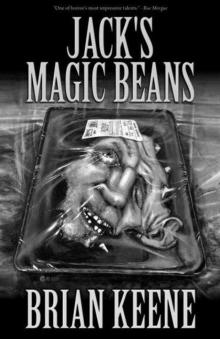 Jacks Magic Beans
Jacks Magic Beans Ghost Walk
Ghost Walk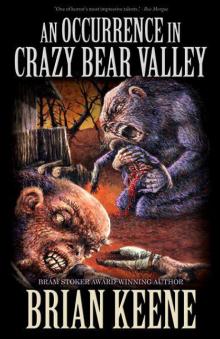 An Occurrence in Crazy Bear Valley
An Occurrence in Crazy Bear Valley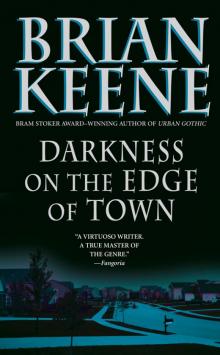 Darkness on the Edge of Town
Darkness on the Edge of Town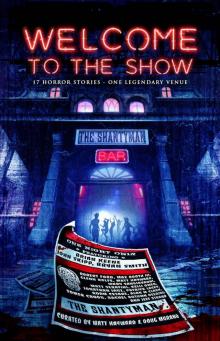 Welcome to the Show: 17 Horror Stories – One Legendary Venue
Welcome to the Show: 17 Horror Stories – One Legendary Venue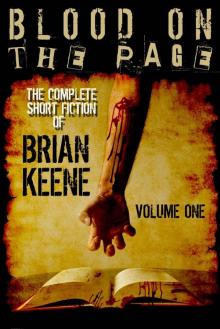 Blood on the Page: The Complete Short Fiction of Brian Keene, Volume 1
Blood on the Page: The Complete Short Fiction of Brian Keene, Volume 1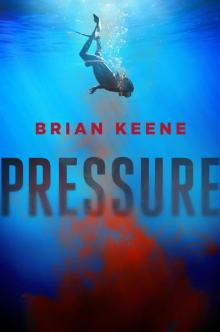 Pressure
Pressure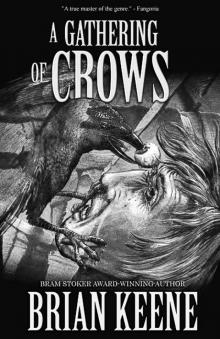 A Gathering of Crows
A Gathering of Crows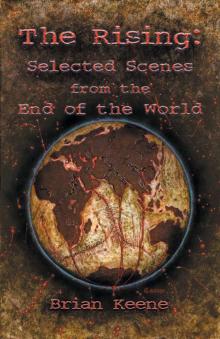 The Rising: Selected Scenes From the End of the World
The Rising: Selected Scenes From the End of the World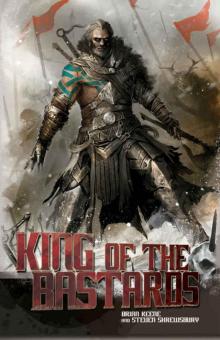 King of the Bastards
King of the Bastards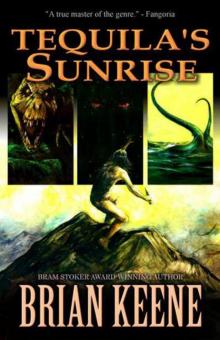 Tequila's Sunrise
Tequila's Sunrise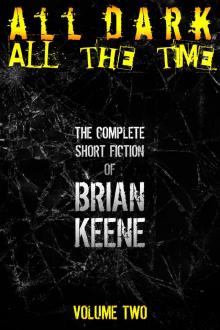 All Dark, All the Time
All Dark, All the Time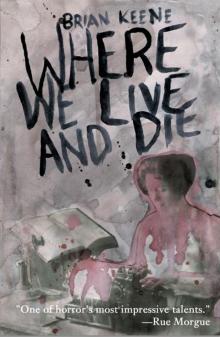 Where We Live and Die
Where We Live and Die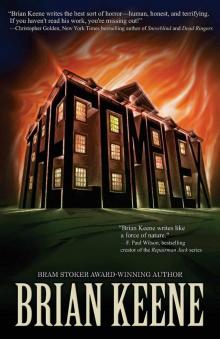 The Complex
The Complex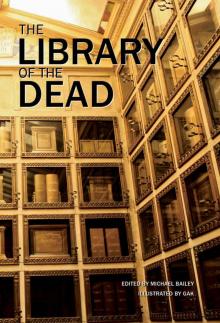 The Library of the Dead
The Library of the Dead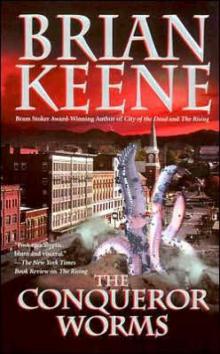 The Conqueror Worms
The Conqueror Worms The Girl on the Glider
The Girl on the Glider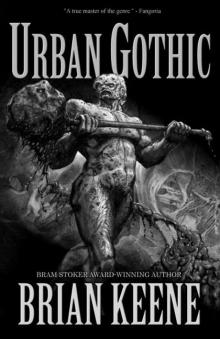 Urban Gothic
Urban Gothic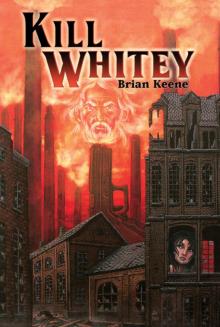 Kill Whitey
Kill Whitey Terminal
Terminal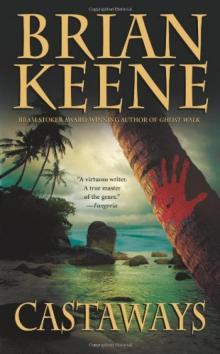 Castaways
Castaways